The Meaning Of Life ┇Powerful Spoken Word┇# lebo2196
Posted in UncategorizedOctober 23, 2013No comments
Posted in UncategorizedOctober 23, 2013No comments
Posted in UncategorizedOctober 23, 2013No comments
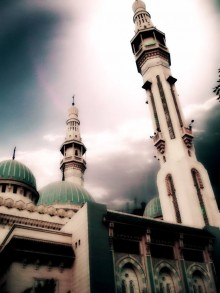
ACTIONS UPON HEARING ATHAAN – CALL FOR A PRAYER
There are five Sunnah actions (i.e. Prophetic actions) recommended by the Prophet Peace be upon him – Upon hearing the call for the prayer, as mentioned in Zad Al Ma’ad Book, by Ibn Al Qayyem:
1 ➲ The hearer should repeat after the Mo’athen (The one who calls for prayer) all words except when the Mo’athen says:
“حَيَّ عَلَى الصَّلاَةِ وَحَيَّ عَلَى الْفَلَاحِ”
Hayya ‘alas-Salaah (come to prayer) and Hayya ‘alal-Falaah (come to prosperity).
Here you should say:
“لَا حَوْلَ وَلَا قُوَّةَ إِلَّا بِاللهِ”
Laa hawla wa laa quwwata ‘illaa billaah (There is no might, or power, except with Allah)
Al-Bukhari, The Book of Prayer, Hadith 613;
Muslim, The Book of Prayer, Hadith 385. The wording is according to Muslim
The benefit of this Sunnah: You will be rewarded with Paradise as stipulated in Sahih Muslim.
2 ➲ The hearer should say:
“وَأَنَا أَشَْهَدُ أَنْ لَا إِلَهَ إِلَّا اللهُ وَحْدَهُ لَا شَرِيكَ لَهُ وَأَنَّ مُحَمَّداً عَبْدُهُ وَرَسُولُهُ، رَضِيتُ بِاللهِ رَبَّاً وَبِمُحَمَّدٍ رِسُولاً وَبِالإِْسلاَمِ دِيناً”.
Wa ‘anaa ‘ash-hadu ‘an laa ‘ilaaha ‘illallaahu wahdahu laa shareeka lahu wa ‘anna Muhammadan ‘abduhu wa Rasooluhu, radheetu billaahi Rabban, wa bi-Muhammadin Rasoolan wa bil’islaami deenan.
(And I also bear witness that there is no deity has the right to be worshipped but Allah alone, Who has no partner, and that Muhammad is His slave and His Messenger. I am pleased with Allah as my Lord, with Muhammad as my Messenger and with Islam as my religion.)
To be recited in Arabic after the Mu’aththin’s Tashahhud or the words of affirmation of Faith
Muslim, The Book of Prayer, Hadith 386
The benefit of this Sunnah: Allah will forgive your sins, as stipulated in the same prophetic tradition.
3 ➲ After the Mo’athen finishes the Athan (The call for prayer), you should ask Allah’s blessings upon the Prophet (Peace be upon him), and the best supplication which can be said in this regard is the “As-Salawat Al Ibrahimiah” – as mentioned below.
The Prophet – Peace be upon him – said:
“When you hear the Mo’athen calling for the prayer, repeat his words then ask Allah’s blessings upon me, because the one who asks Allah’s blessings upon me once will be rewarded ten blessings by Allah.”
Muslim, The Book of Prayer, Hadith 384
The benefit of this Sunnah: Allah will send ten blessings to the believer i.e. Allah will praise such person at heaven.
The text of As-Salawat Al-Ibrahimiah is:
(Allaahumma salli alaa Muhammadin wa alaa aali Muhammadin, kamaa sallayta alaa Ibraaheema wa alaa aali Ibraaheema innaka Hameedun Majeed. Allahumma Baarik alaa Muhammadin wa alaa aali Mohammadin kamaa baarakta alaa Ibraaheema wa alaa aali Ibraaheema innaka Hameedun Majeed – i.e. O Allah, bestow your favor on Muhammad and on the family of Muhammad as You have bestowed Your favor on Ibrahim and on the family of Ibrahim, You are Praiseworthy, Most Glorious. O Allah, bless Muhammad and the family of Mohammad as You have blessed Ibrahim and the family of Ibrahim, You are Praiseworthy, Most Glorious)
Al-Bukhari, The Book of Stories of the Prophet, Hadith 3370
4 ➲ After asking Allah’s blessings upon the Prophet – Peace be upon him – you should say:
“اللَّهُمَّ رَبَّ هَذِهِ الدَّعْوَةِ التَّامَّةِ، وَالصَّلَاةِ الْقَائِمَةِ، آتِ مُحَمَّداً الْوَسِيلَةَ وَالْفَضِيلَةَ، وَابْعَثْهُ مَقَاماً مَحْمُوداً الَّذِي وَعَدْتَهُ، [إَنَّكَ لَا تُخْلِفُ الْمِيعَادَ].
(Allaahumma Rabba haathihid-da ‘watit-taammati wassalaatil-qaa’imati, ‘aati Muhammadanil-waseelata walfadheelata, wab ‘ath-hu maqaamam-mahmoodanil-lathee wa’adtahu, [‘innaka laa tukhliful-mee’aad])
After replying to the call of Mu’aththin. you should recite in Arabic Allah’s blessings on the Prophet.
(O Allah, Lord of this Perfect Call and Owner of this Prayer to be performed, bestow on Muhammad Al-Waseelah and Al-Fadeelah that You promised him)
Al-Bukhari, The Book of Al-Adhaan, Hadith 614
The benefit of this supplication: The one who says this supplication will deserve the intercession of the Prophet – Peace be upon him.
5 ➲ Finally, you can ask Allah The Almighty anything for yourself and ask the grace of Allah because your supplication will be answered this time.
The Prophet – Peace be upon him – said:
“Repeat the words of the Mo’athen and when you finish, ask Allah what you want and you will get it)
Aboo Daawood, The Book of Prayer, Hadith 524. Al-Haafidh Ibn Hajar graded the Hadeeth as Hasan and Ibn Hibbaan gave it a grading of authentic
➲ The total number of such Sunnah actions if applied upon hearing the Athan (The call for prayer) is ➲ (25) actions of Sunnah.
Posted in Daily Islam,Events,HadithOctober 15, 2013No comments
by Asma bint Shameem [ILoveAllaah.com Exclusive Writer]
Hajj is the most beautiful journey that you will ever undertake in your entire lifetime. And out of those blessed days of Hajj, the one that is the most important, the most crucial, is the day of Arafah, the 9th of Dhul Hijjah. For, it is here, in the vast plain of Arafah, that tears are shed, and sins are washed. And it is here that faults are redressed for those who ask Allah for forgiveness and offer sincere repentance for their wrong doings. Happy is the person who receives the Mercy and Pleasure of Allaah on this particular day. In fact, so important is this day, that if someone misses it, his hajj is not valid as the Prophet صل اللہ عليه و سلم said:
“Hajj is ‘Arafah.” (al-Tirmidhi–saheeh by al-Albaani).
Therefore it is of utmost importance that we make the most of this day and spend it as close as possible to the way of the Prophet صل اللہ عليه و سلم so that we can attain maximum benefit from this glorious day.
Here are some do’s and don’t’s of the day of Arafah:
Do not forget to recite the Talbiyah when you leave Mina for Arafah and continue to do so through out the day of Arafah until the day of Eid. It was proven that the Prophet صل اللہ عليه و سلم continued to recite the Talbiyah until he had stoned Jamarat al-‘Aqabah (the large pillar) on the day of Eid. Some people forget that and thus miss out on this wonderful act of Ibaadah that can only be done during Hajj and Umrah.
What beautiful words they are…
Here I am O Allaah….at Your service….submitting to You, humbling myself to You….ready to make a change in my life….ready to please You….ready to leave everything except You. You are my Lord and I worship no one but You.
Think about the words and the connotations they carry….don’t just say them. Reflect on the meanings…Let the words come deep from your heart….from within your very soul, not just your tongue.
What magnificent words to say on such a majestic day….Subhaan Allaah!
This is the day you’ve been waiting for….the day of Arafah. This is THE DAY to make dua. If there was ever a day to make dua, this is that day. The Prophet صل اللہ عليه و سلم said:
“The best of du’aa’ is du’aa’ on the day of ‘Arafah.” ( al-Muwatta–hasan by al-Albaani in Saheeh al-Jaami)
This is the day you will pour out your heart, and empty your soul to the Lord of the worlds, your Creator, the One Who has given you every single thing you can think of. The One Who has invited you here on this honored day of Arafah, from half way across the world, as His guest.
Otherwise you wouldn’t be here. Otherwise you wouldn’t be here.
What an honor! And what a chance to have your duas accepted!
So go ahead. Ask. Stretch out those hands of yours in humble submission. Beseech and implore. He is Allaah, ar-Rahmaan, al-Kareem, the Most-Generous. Surely He will give you.
The best dua for this day:
The Prophet said: “The best of du’aa’ is du’aa’ on the day of ‘Arafah, and the best that I and the Prophets before me said is:
لا إله إلا الله وحده لا شريك له ، له الملك وله الحمد وهو على كل شيء قدير
‘Laa ilaaha ill-Allaah wahdahu la shareeka lah, lahu’l-mulk wa lahu’l-hamd wa huwa ‘ala kulli shay’in qadeer
(There is no god but Allaah alone, with no partner or associate; His is the dominion, to Him be praise, and He has power over all things).” (al-Tirmidhi–hasan by al-Albaani in Saheeh al-Targheeb)
The Prophet صل اللہ عليه و سلم said: “There is no day on which Allaah ransoms more of His slaves from the Fire than the day of ‘Arafah. He draws close then He boasts about them before the angels and says, ‘What do these people want?’” (Muslim)
And you know what? Allah descends to the sky of the Duniya and He boasts about you to the Angels, on this day and says: ‘My slaves have come to Me, looking rough, from every deep valley hoping for My mercy, so if your sins were equivalent to the amount of sand or the drops of rain or like the foam on the sea I will forgive them. So go forth My slaves! Having forgiveness and for what or who you have interceded for.’ (at-Tabarani–hasan by al-Albaani)
Subhaan Allaah! Here is a chance of a lifetime to have all your previous sins forgiven, your record cleared…wiped clean as if you were a newborn…a second chance!
So think of all the sins you may have committed in your life, especially the major ones, make a list of them, (nobody has to see it except you) and ask the Only One Who forgives, al-Ghafoor, at-Tawwaab, to forgive you….urgently…. passionately.
CRY over your sins and don’t let anything stop those tears. Let it all out and plead with Him. Beg for His Mercy. Like a beggar begs….desperate…yet hopeful.
a) feeling regret and shame over those bad deeds,
b) resolve to stop them right away and
c) never ever to return to them.
These are the conditions of sincere tawbah. And all these records which were filled with sins will then be canceled out with His permission.
Obviously the closest we will be to the Sunnah of the Prophet صل اللہ عليه و سلم this day, the more likely that Allaah Subhaanahu wa Ta’ala will be pleased with us and accept it from us.
And anything that is not part of the Sharee’ah that the Prophet صل اللہ عليه و سلم brought, is an innovation in the deen and isrejected by Allaah.
It is something that Allaah is NOT pleased with and thus will not be accepted by Him.
As the Prophet صل اللہ عليه و سلم said:
“Whoever does any action that is not in accordance with this matter of ours (Islaam) will have it rejected.” (Muslim)
Imagine doing something that Allaah is not pleased with, on this glorious day?!! Imagine Allaah turning away from you and your Ibaadah!! Aoodhubillaah.
Surely, there is no one more unfortunate than the one who comes all the way from his home far far away, to Makkah for Hajj, who worked hard gathering his money, making all the arrangements, hoping for reward from Allaah, only to have it rejected because he followed bid’ah!
What a heavy, horrible loss indeed!
BEWARE: Included in the bid’ah are those printed papers with ‘formulas’ and ‘prescriptions’ to be read on the day of Arafah, that are sometimes circulated among the hujjaaj, telling you to read certain supplications one 100 times and certain ayaat one 100 times, picking specific ayaat and duas to be read a specific number of times.
Please, please stay away from such ‘prescriptions’ and ‘formulas’ even if it is supplications from the Sunnah or even ayaat form the Qur’aan.
It is wrong because even though they may be ayaat from the Qur’aan or authentic duas from the Sunnah, yet it is NOT from the practice of the Prophet or the sahaabah that they said these specific duas and ayaat in this manner and a specific number of times, on the day of Arafah.
If it was good, surely the best of creation, the Prophet صل اللہ عليه و سلم, who knew how to worship Allaah the best, certainly would have done so himself and would have certainly told the sahaabah about it.
Yet, there are NO authentic reports that tell us that he صل اللہ عليه و سلم or the sahaabah did any of this.
One may read any ayaat of the Qur’aan, or one may use any of the Sunnah duas, not these specific ones only and one may read them without specifying the number of times they to be read.
There should be no restriction to a specific number or manner.
Just think about it. Would you want to risk doing something that you are not sure of this day?!!
Why not choose those acts of Ibaadah that are for sure, a part of the practice of our beloved Prophet صل اللہ عليه و سلم and the Sahaabah? Something that is established in our deen in the manner it was done, the times it was done and the places it was done.
Isn’t what the Prophet صل اللہ عليه و سلم did on his hajj, the best example to follow?!!
So if he صل اللہ عليه و سلمdidn’t read these ayaat and duas in this manner and count, we don’t do it either. And his is the best example to follow.
The Prophet صل اللہ عليه و سلم did not pray any other prayers on this day except combining Dhuhr and Asr at its earlier time. There was no other prayer that he prayed this day. Rather he spent his time making dua. And if he صل اللہ عليه و سلم didn’t do it, that means that there is we shouldn’t do it either.
He صل اللہ عليه و سلم said: “Learn from me your rituals (of Hajj).” (Muslim)
The Ulama said: “The Messenger (sal-Allaahu `alayhe wa sallam) did not perform any supererogatory prayers on the Day of ‘Arafah after having offered Salaat az-Zhuhr and Salaat al-‘Asr combined and at the time of Zhuhr. And if it was legislated and good then he would have been more careful about performing them than us, and all good is in adhering to following his Sunnah.” (Fataawa al-Lajnah ad-Daa.imah lil-Buhooth al-‘Ilmiyyah wal-Iftaa).
Salaat at-Tasbeeh is not proven to be from the Sunnah according to the majority of the Ulama such as Imaam Ahmad, Ibn Taymiyah, al-Nawawi, ibn Qudamah, Ibn Uthaaymeen, etc.
Shaykh Ibn ‘Uthaymeen said: “Salaat al-Tasbeeh is not prescribed, because the hadeeth is da’eef (weak).”
Imaam Ahmad said there is no sound evidence for it.
Shaykh al-Islam Ibn Taymiyah said it is a fabrication, and he said that none of the Imaams recommended it.”
So if it is something that is not from the Sunnah, then why do it, especially on an important day like Arafah?
And even if some of the Ulama did regard it as something that can be done, realize that most of the Ulama say that it is not to be read. Now, for something that is doubtful, wouldn’t you want to leave it and worship Allaah in a way that is for sure prescribed in the Sharee’ah?
Would you want to risk your day of Arafah for something doubtful?
Didn’t the Prophet صل اللہ عليه و سلم say? “Leave that which makes you doubt for that which does not make you doubt.” (al-Tirmidhi–Saheeh by al-Albaani)
Thus it is best to leave it and engage in dua, dhikr, etc that is confirmed from the Prophet صل اللہ عليه و سلم
Keep your self busy in the dhikr of Allaah, glorifying Him and being thankful to Him, sending blessings upon the Prophet صل اللہ عليه و سلم and in dua and istighfaar.
Don’t let a second, yes, a second go by when you are not remembering Him.
This is the way to keep yourself busy this day, with dua, istighfaar and tasbeeh, (“Subhaan Allah”), tahleel (Laa ilaaha ill-Allaah), tahmeed (al-hamdu Lillah), takbeer (Allahu akbar) and Talbiyah, calling upon your Rabb and beseeching Him, until the sun sets.
Please DO NOT waste your time in things like unnecessary talking, mingling, joking, or just passing the time, things that will be of no benefit to you that day.
Taking showers
Some people waste precious time taking showers and more than that…waiting in the long lines to take showers!
Don’t you know that Allaah knows that you are dirty and disheveled? In fact Allaah boasts about you and your dustiness to His angels.
“Allah expresses His pride to His angels at the time of ‘Ishaa’ on the Day of Arafah, about the people of Arafah. He says, ‘Look at My slaves who have come unkempt and dusty.’” (Ahmad–saheeh by al-Albaani).
It’s ok to be a little dusty. That’s the whole purpose of Hajj. To remind ourselves that we will be leaving all the luxuries of this life behind…that we will be resurrected like this, dusty and disheveled one day, that what really matters is what our deeds are like in front of Allaah, not our outward appearances.
Waiting in long lines for food
Some people stand literally for an hour just to get ‘hot food’. Subhaan Allaah. This is Arafah!
You never know when you will get a chance like this again. This is the time to ask Allaah’s forgiveness, to have your sins washed away. This is not the time to eat and drink. That can be done later.
Now don’t get me wrong. I’m not saying don’t eat or drink that day. You may eat or drink. All I’m saying is not to stand in lines for long periods of time for food or for anything else.
If one day we eat ‘cold food’ who cares, right? Just utilize your time to the best of your ability.
Climbing up Mount Arafah (Jabal ar-Rahmah)
Some people waste so much time and go to great lengths trying to get to Mount Arafah thinking there is extra reward in touching it, praying there or standing there. There is no such thing. The Prophet صل اللہ عليه و سلم did not climb this mountain or instruct anyone to do so, and he did not approve of anyone climbing it either.
Shaikh Ibn Uthaymeen says: “…climbing this mountain is not prescribed; rather the Messenger of Allah (blessings and peace of Allah be upon him) said, when he stood behind it on the eastern side: “I have stood here and all of ‘Arafah is the place of standing.” It is as if he (blessings and peace of Allah be upon him) was indicating that each person should stand in his own spot and not push and shove in order to reach the place where the Messenger (blessings and peace of Allah be upon him) stood.” Majmoo’ Fataawa Ibn ‘Uthaymeen)
Similarly, don’t waste your time trying to get masjid Namirah
Yes, although it is Sunnah to pray at Masjid Namirah, it is extremely crowded and usually far from some of the tents. Yet some people go through a lot of hardship and waste a lot of time trying to get there because they think that they have to pray Zuhr and ‘Asr there. This causes them a great deal of hardship and causes crowding etc. Some even get lost and lose even more time. The whole of Arafah is good to pray and stand and make dua. The important thing is to utilize our time there to the maximum and worship Allaah so that He will forgive us.
Once Umar ibn ‘Abdul-‘Azeez delivered a Khutbah at Arafah and said, “O people, you have come from near and far distances, exhausted your camels, and worn out your clothes. The winner today is not the one whose camel is ahead, but rather it is the one whose sins are forgiven. Praise be to Allaah – the Lord of the worlds.”
May Allaah enable us to worship Him in the best manner possible on the Day of Arafah and every other day. May He accept our Hajj and forgive us. Aameen.
Posted in UncategorizedOctober 14, 2013No comments
Posted in UncategorizedOctober 14, 2013No comments
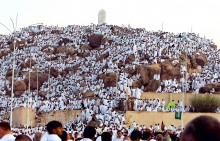
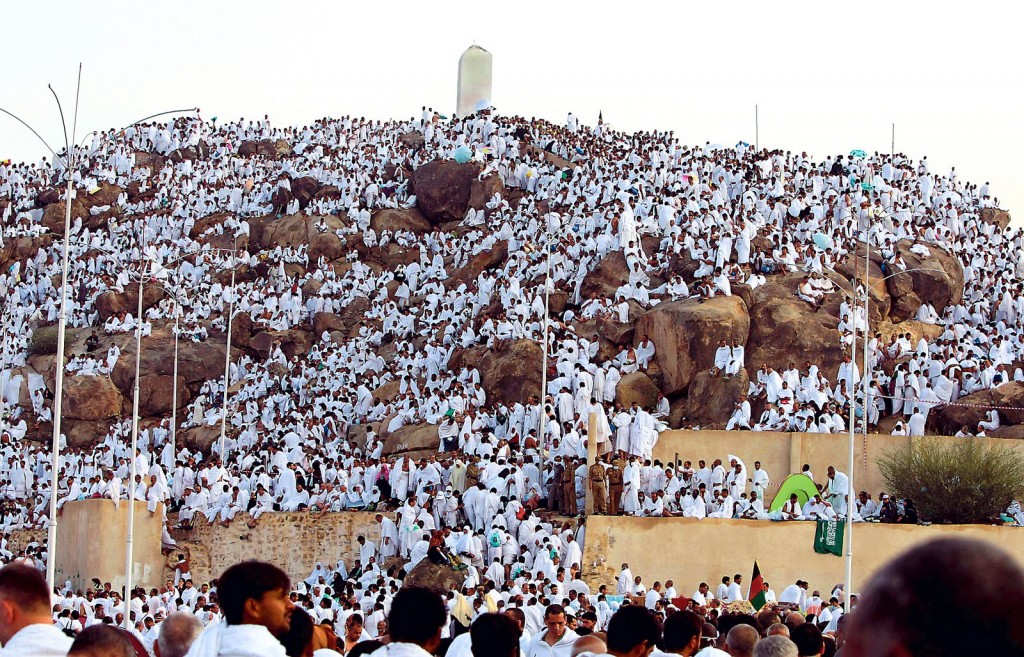 9th of Dhul Hijjah is the Day of Arafaah.
9th of Dhul Hijjah is the Day of Arafaah.
It is the day on which the religion was perfected and Allah’s Favour was completed
It is a day of Eid for the people who are in that place.
It is a day by which Allah swore an oath.
Fasting on this day is an expiation for two years.
It is the day on which Allah took the covenant from the progeny of Adam.
It is the day of forgiveness of sins, freedom from the Fire and pride in the people who are there.
Posted in UncategorizedOctober 11, 2013No comments
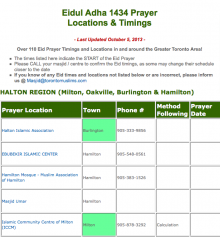
Eidul Adha 1434 on Tuesday (Oct. 15) AND Wednesday (Oct. 16) 2013
Depending on the Masjid / moonsighting method you choose to follow, here are the Eidul Adha and Arafat Day details:
1. According to the GTA Hilal Committee (local moonsighting), the Crescent Committee (global moonsighting) Eidul Adha 1434 will be celebrated on Wednesday, October 16, 2013.
2. Based on the moonsighting in Saudi Arabia and the Fiqh Council of North America (calculation), Eidul Adha 1434 will be celebrated on Tuesday, October 15, 2013, and the day of Arafat would be Monday, October 14, 2013.
Posted in UncategorizedOctober 11, 2013No comments
When We bestow Our favour upon man, he turns away and waxes proud; but when a misfortune touches him, he is full of supplication.
Posted in UncategorizedOctober 11, 2013No comments
Posted in UncategorizedOctober 10, 2013No comments
Hii, so we had an idea for a video, it was to Pray in Public and to film what reactions we would get. So, we decided to get a compass, do wudu, go out and pray sunnah (2 rakkahs) for Allah and to film what reactions we would get. Our intention was to show the world that Muslims are more peaceful then what they think. Almost everybody was so nice and respected us for being dedicated and faithful to our religion. Hope you guys enjoyed the video and SPREAD the LOVE! thanks! much LOVE
-TrueStoryASA
SUBSCRIBE and stay updated with our latest videos!
http://www.youtube.com/user/TrueStoryASA
https://www.facebook.com/TrueStoryASA…
https://www.facebook.com/AdamSaleh23
https://www.facebook.com/sheikh.akbar…
https://twitter.com/TrueStoryASA
https://twitter.com/omgAdamSaleh
https://twitter.com/SheiikhAkbaar
Instagram:
@SheikhAkbar
@AdamSaleh
Posted in UncategorizedOctober 10, 2013No comments
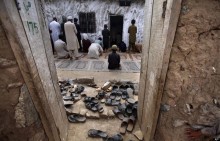
Source: http://www.ilmgate.org/
It should be remembered that in Salah, one communicates with one’s Lord, therefore, one should consider how one offers his/her Salah. Allah ta’ala has commanded us to establish the Salah. Establishment means to carry out Salah and all its constituents (including it’s pre-requisite: wudu [ritual ablution]) very carefully. Although the command will apply to the Salah in general, however, one should be extremely particular about the following points:
An Extraordinary Wisdom Behind Wudu and the Purity of Clothes
The clothes of a musalli (person performing Salah) can be likened to the outer peel of a fruit and the body the inner layer. The heart above all is like the kernel within, and needless to say, that the object of the fruit is the kernel. Now the arrangement of all these is such that the condition of one will affect the other. Hence, the peel has to be protected in order to preserve the kernel.
Similar is the case with Salah. The soul and the heart are sure to be influenced due to the outward condition of the body and clothes. Accordingly, one will experience a unique feeling of purity and cleanliness in the heart after having performed wudu that was not present before it.
Evidently, this is the effect of wudu. In conclusion, what seems to be a mere washing of arms and face isn’t only a means of physical cleanliness, but a spiritual one as well. In fact, the act of wudu has been designed chiefly to do away with the impurities of the heart and thereby, building within, the capability to face and communicate with the Lord.
The Benefits of Salah
All the constituents of Salah should be carried out in the correct manner, regardless of whether they are fard, wajib, sunnah or mustahab. One should remember that as the purity of body and clothes affect the heart, the manner in which the Salah is performed, in general, will also have an effect.
A musalli, inspite of his ignorance of the secrets and spiritual effects of Salah, will nevertheless benefit from it.
A musalli, in this context, can be likened to a sick person who, despite not knowing the ingredients and the healing properties of a medicine, is cured by it.
Salah also has a Spirit and a Body
In the transcendental world, like the tangible phenomena, the abstract too have been accorded bodies and spirits by Allah. Salah is no exception. Each of its constituents will go to signify something. Sincerity and concentration form its spirit; the various postures its body, with the ruku’ and sajdah being the arms and legs; the recitations of different postures will stand for the essential organs, such as the eyes and the ears.
Further, to comprehend the meaning of these recitations will give the organs the senses they require, like the sense of hearing and the power of vision etc. Moreover, to offer the Salah with calmness, humility, and fear will constitute its beauty and good complexion. In short, the degree of the beauty and perfection of Salah will be judged by the manner in which it is performed.
In addition to above, there is also the Nearness of Allah that is an objective of Salah.
To make this better understood, it can be said that Salah in the Court of Allah is like a precious gift that is being presented to a king. In this context, it would be more appropriate if we used the example of a slave maid as the gift.
If, suppose, the Salah lacked ruku’ and sajdah, it will be like presenting a lame and crippled slave maid. Similarly a Salah performed without any recitation and dhikr is like the mutilated body of a slave maid. If the recitation is present, but the musalli can hardly comprehend its meaning or is unmindful towards it, it is as if the slave maid lacks the basic senses of seeing and hearing. If, say, the Salah is devoid of sincerity and concentration, it is like presenting the king with the dead body of a slave maid. The gravity of this crime of insulting the king is not too difficult to imagine and it will be punishable only by death. What the outcome of a person gifting such a slave maid will be is quite obvious.
Perhaps, one may object by saying that when all the compulsory acts of Salah are discharged, the Ulama render the Salah valid, regardless of whether the musalli has understood the meaning of any recitation or not. The purpose, therefore, is achieved. This ultimately [means] that to comprehend the meanings of the recitations is not at all necessary due to not having any effect on the validity of the Salah.
The point to understand here is that the Ulama are like physicians and doctors. No matter how frail and disabled a person is, as long as he is breathing and still alive, the doctors will not pronounce him dead.
Similarly, if the major constituents of Salah, like ruku’, sajdah and recitation are present, the Ulama will deem the Salah to be valid. Their rendering it valid is undoubtedly correct, but the point to consider here is that the Salah stands as a precious gift presented in the Royal Court; and, as mentioned, a physically and mentally impaired slave maid will never do as a precious gift. In fact, this would be classed as an outright insult to the king, deserving his anger and severe punishment. Likewise, the presentation of a deficient Salah will inevitably result in the Salah being rejected and thrown back at the musalli‘s face.
It should be understood that the above example has been cited only for the sake of understanding the point, otherwise there is no comparison between the Court of Allah and that of a king.
In short, since the object of Salah is to dignify and honor Allah ta’ala, the degree of this dignity and honor will be assessed in proportion to the perfectness of Salah. Any deficiency in Salah will, therefore, amount to dishonoring the Divine Being.
The Soul and Limbs of Salah
One should be extremely particular about the soul of Salah, i.e. sincerity and concentration.
The words uttered by the tongue should penetrate the heart. Upon the utterance of the words ”Allahu Akbar“ (Allah is the Greatest), for instance, the heart should reflect upon the Greatness of Allah and imagine every other entity to be downright inferior in comparison.
When saying the words Alhamdulillah” (All praises are due to Allah), the heart should fill with gratitude and joyfully sing praises of the Almighty. Similarly, upon reciting the verse”Iyyaka na’budu wa-iyyaka nasta’een“ (You Alone we worship, and from You Alone we seek help) the feelings of humility, weakness and inability should prevail and the Omnipotence of Allah should be predominant. The various movements and postures of Salah should also send an impact on the heart. In the case of ruku’, for example, the heart, in harmony with the body, should also bow with humility. To sum up, it can be said that the outward and inward conditions of the body should be in total consistence, as regards the recitations and other constituents of Salah.
Another point to remember here is that the Salah which is recorded in the Book of Deeds as creditable is only one performed with due concentration, sincerity and attention. A Salah devoid of these factors will be unworthy of acceptance.
The Method of Acquiring Concentration
In the initial stages, it is not uncommon for anybody to suffer from digression of thoughts and lack of concentration, but one will have to be determined and show diligence in regulating one’s thoughts and regaining concentration. Gradually, however, such diligence will not be required as one will begin to get accustomed and digression will soon diminish.
In the meantime, one should never become frustrated due to setbacks, but continue to practice as only practice will make it perfect. Concentration should increase in every subsequent Salah.
If ever, one notices any decrease, it should be compensated by offering optional (nafl) rak’ats – as a penalty – in proportion to the ones performed without concentration. Say, for instance, out of four rak’ats of compulsory Salah, only two or the amount of two were performed with due concentration, nafl rak’ats should be offered for as long as one acquires enough concentration to make up for the two compulsory ones.
Similarly, if one has to even perform ten nafl rak’ats in order to gather sufficient concentration for a few fard (compulsory) rak’ats, one should not desist from doing so.
It may be hoped, then, that Allah, through His Grace, will accept the latter rak’ats as a recompense for the deficiency in the former ones.
Courtesy of Islamic Da’wah Academy
Posted in UncategorizedOctober 8, 2013No comments
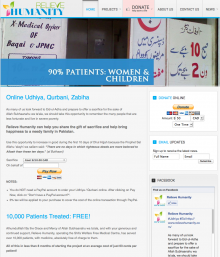
As many of us look forward to Eid-ul-Adha and prepare to offer a sacrifice for the sake of Allah Subhaanahu wa ta’ala, we should take this opportunity to remember the many people that are less fortunate and live in severe poverty.
Relieve Humanity can help you share the gift of sacrifice and help bring happiness to a needy family.
Use this opportunity to increase in good during the first 10 days of Dhul Hijjah because the Prophet Sal Allahu ‘alayhi wa sallam said: “There are no days in which righteous deeds are more beloved to Allaah than these ten days.” (al Bukhaari)
Posted in UncategorizedOctober 8, 2013No comments

Posted in UncategorizedOctober 8, 2013No comments

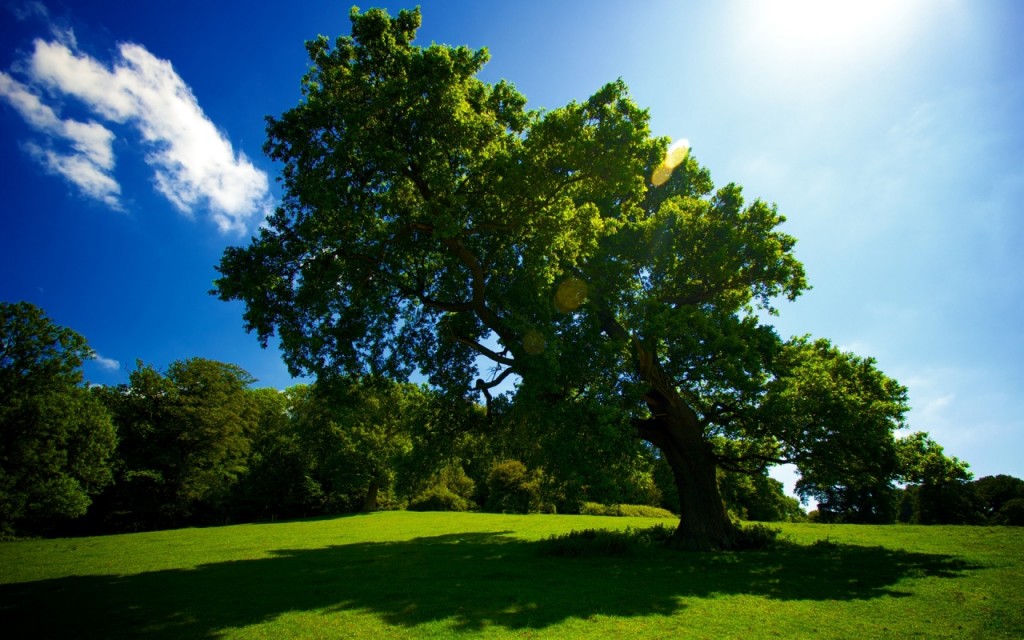 7 people whom Allah will shade, on the day when there is no shade except the shade of his throne:
7 people whom Allah will shade, on the day when there is no shade except the shade of his throne:
1. A just ruler.
2. A young man who grows up worshiping his Lord.
3. A man whose heart is attached to the masjid.
4. Two men who love one another for the sake of Allah and meet and part on that basis.
5. A man who is called by a women of rank and beauty and says “I fear Allah.”
6. A man who gives in charity and conceals it to such an extent that his left hand does not know what his right hand gave.
7. A man who remembers Allah when he is alone, and his eyes fill up.
Posted in UncategorizedOctober 7, 2013No comments

Eīd Mubārak! Eīd al Adḥā is on Wednesday 16th October, 2013.
The Crescent Committee of Canada has declared the 1st of Dhul Ḥijjah to be on Monday 7th of October, 2013. The 10th of Dhul Ḥijjah (Eīd al Adḥā) is on Wednesday 16th October, 2013 In shā Allāh.
There were no verifiable crescent sightings anywhere in the world on the eve of 29 Dhul Qa’adah 1434 AH (5 October 2013 CE). Therefore the month of Dhul Qa’adah completes 30 days and the 1st of Dhul Ḥijjah will be on Monday 7th of October, 2013. The 10th of Dhul Ḥijjah (Eīd al Adḥā) is on Wednesday 16th October, 2013 In shā Allāh.
May Allah bless one and all with the bounties of Dhul Ḥijjah and Eīd al Adḥā. Eīd Mubārak!
Saudi Declaration
We are aware of the Saudi declaration; however scientific astronomical data proves that it was impossible for the moon to be sighted in Saudi Arabia. Muslim astronomy experts such as Mohammad Odeh and Khalid Shaukat also confirm the impossibility of moon sighting in the Middle East on the eve of 29 Dhul Qa’adah 1434 AH (5 October 2013 CE). We have also confirmed this information with the Royal Astronomical Society of Canada.
Chile Sighting with Optical Aid
We are aware, that on Sunday 6th of October, 2013, Moonsighting.com has posted a reported sighting with optical aid in Chile. Our position is that the Shari’ah does not impose [or make the] believers [mukallaf] for optical aid. The sighting must be a naked eye sighting. This is also clear in our policy and guidelines. Kindly refer to this link for details regarding our guidelines and procedures: http://crescentcommittee.ca/guidelines-procedure/
The experienced moon-sighters in Chile searched for the crescent on the eve of the 29th of Dhul Qa’adah and were not able to observe the new crescent. The skies were also cloudy in most regions of Chile. The experienced moon-sighters also traveled to the high areas of Chile, but did not sight the moon. Please see the images and video below, sent to us by the experienced moon-sighters in Chile.
Posted in UncategorizedOctober 4, 2013No comments
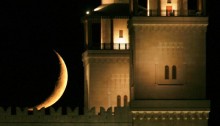
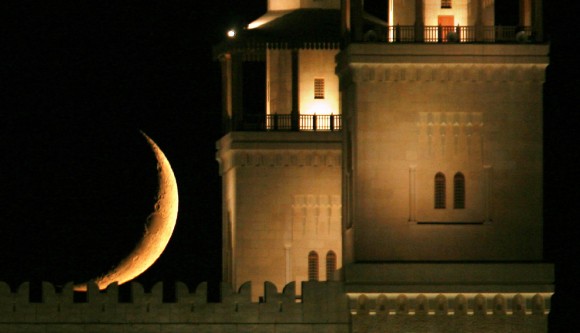
Significance of the First Ten Days of Zul Hijjah
1. Allah has taken oath of ten nights in Soorah Al-Fajr. According to the majority of the commentators of Qur’ãn, the nights are those of the (first) ten days of Zul Hijjah.
2. Abdullah Ibne ‘Abbãs radiyallahu anhu related that the Prophet sallalahu alayhi wasallam said, “Good deeds performed on other days are not superior to those performed on these (first ten days of Zul Hijjah).” The Companions radiyallahu anhum inquired, “Not even Jihãd?” He replied, “Not even jihãd, except for that person who goes out putting himself and his wealth in danger and does not return with anything.” (Bukhãri)
3. Abdullah Ibne ‘Abbãs radiyallahu anhu narrated that Rasoolullah sallalahu alayhi wasallam said, “On no other days are good deeds more liked by Allah than on these ten days (i.e. The first ten days of Zul Hijjah).” The Sahãbah radiyallahu anhum asked, ” O Rasoolullah ! Not even Jihãd in the Way of Allah?” Rasoolullah sallalahu alayhi wasallam replied, “Not even Jihãd in the Way of Allah, except for that person who goes out with his life and wealth and does not return with anything.” (Aboo Dãwood, Tirmizi, Ibne Mãjah)
4. Aboo Hurayrah radiyallahu anhu related that Rasoolullah sallalahu alayhi wasallam said, “On no days is the worship of Allah desired more than in the (first) ten days of Zul Hijjah. The fast of each of these days is equal to the fast of a whole year, and the worship of each of these nights is equal to the worship of Laylatul Qadr.” (Tirmizi, Ibne Mãjah)
5. The mother of the believers, Hafsah radiyallahu anhaa reports that Rasoolullah sallalahu alayhi wasallam used to fast the (first) nine days of Zul Hijjah. (Nasã’ee, Ahmad, Aboo Dãwood)
6. Abdullah Ibne ‘Umar radiyallahu anhu related that Rasoolullah sallalahu alayhi wasallam said, “No days are as weighty with Allah and so liked by Him for good deeds than the first ten days of Zul Hijjah. So on these days increasingly read Subhãnallah, Lã ilãha illallãh, Alhamdulillah and Allahu Akbar.” (Musnad Ahmad)
Virtues of the Day of Arafah (9th Zul Hijjah)
1. ‘Ã’ishah radiyallahu anhaa reports that Rasoolullah sallalahu alayhi wasallam said, ” There is no day in which Allah sets free more souls from the fire of hell than on the day of Arafah. And on that day Allah draws near to the earth and by way of exhibiting His Pride remarks to the angels, ‘What is the desire of these (servants of mine)?” (Muslim)
2. Talhah radiyallahu anhu reports that Rasoolullah sallalahu alayhi wasallam said, “Apart from the day of the Battle of Badr there is no day on which the Shaytãn is seen to be more humiliated, more rejected, more depressed and more infuriated, than on the day of Arafah, and indeed all this is only because of beholding the abundance of descending mercy (on the day) and Allah’s forgiveness of the great sins of the servants.” (Mishkãt)
3. Aboo Qatãdah Al-Ansãri radiyallahu anhu narrated that Rasoolullah sallalahu alayhi wasallam was asked about the fast on the day of Arafah. He said, “It compensates for the (minor) sins of the past and the coming year.” (Muslim, Tirmizi, Ibne Mãjah)
Night of ‘Eidul Adh’hã
The nights of both ‘Eed are described in the Hadeeth as amongst the great and sacred nights in the Muslim calendar. To remain awake on the nights of ‘Eed and perform ‘ibãdah is a source of great virtue and reward.
1. Aboo Umarah radiyallahu anhu related that ‘Ã’ishah radiyallahu anhaa reports that Rasoolullah sallalahu alayhi wasallam said, “Whosoever stays awake and performs ‘ibãdah (worship) on the nights of the two ‘Eed, with hope for abundant reward (from Allah), his heart will not die on the day (i.e. Qiyãmah) when all hearts will be dead.” (Targheeb)
2. Mu’ãz Ibne Jabal radiyallahu anhu relates that Rasoolullah sallalahu alayhi wasallam said, “Jannat is wãjib (incumbent) for those who stay awake with the intention of making ‘ibãdah on the following nights: 8th, 9th and 10th of Zul Hijjah, the night of ‘Eedul Fitr and the night of the 15th of Sha’bãn.” (Targheeb)
Virtues of Qurbãni
Rasoolullah sallalahu alayhi wasallam said, “There is nothing dearer to Allah during the days of Qurbãni than the sacrificing of animals. The sacrificed animal shall come on the Day of Judgement with its horns, hair, and hooves (to be weighed). The sacrifice is accepted by Allah before the blood reaches the ground. Therefore sacrifice with an open and happy heart.” (Tirmizi, Ibne Mãjah)
Takbirãt of Tashreeq
The Takbirãt of Tashreeq are:
Allahu Akbar, Allahu Akbar,
Lã ilãha illallãhu wallahu Akbar,
Allahu Akbar, Walil lahil hamd.
“Allah is the Greatest, Allah is the Greatest. There is no deity besides Allah and Allah is the Greatest. Allah is the Greatest and all praises are for Allah only.”
It is wãjib for every adult Muslim to recite these Takbirãt of Tashreeq audibly once after every fardh salaah which is performed with jamã’at (congregation) from the Fajr of 9th Zul Hijjah to the ‘Asr of 13th Zul Hijjah (i.e. total of 23 salãh).
Mas’alah: Women should not say it loudly but softly.
Mas’alah: Takbeer should be recited immediately after concluding the fardh prayer.
Posted in UncategorizedOctober 4, 2013No comments
Posted in UncategorizedOctober 2, 2013No comments
